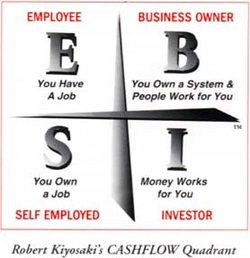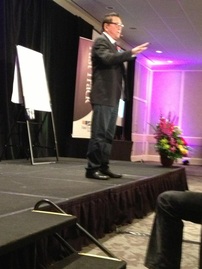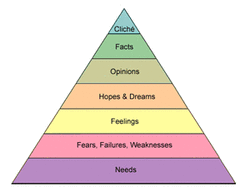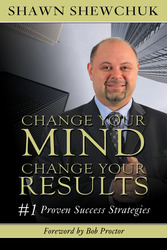
Freedomway.ca
facebook.com/stefanaarnio
https://twitter.com/stefanaarnio
http://ca.linkedin.com/in/stefanaarnio
Get Stefan Aarnio's book "Money People Deal: The Fastest Way to Real Estate Wealth" at MoneyPeopleDeal.com!
Remember: Please share this article if you found it enjoyable!
A wise man once said: " Entrepreneurship is living a few years of your life like most people won’t, so that you can spend the rest of your life like most people can’t." -Unknown
Everyone dreams of having the rewards of a successful entrepreneur. We all want more free time, less work, less stress, more money, more vacations, the best spouse possible, a great family, more satisfaction at work, a creative outlet, independence and more cheques in the mailbox than bills. However, everything in life has a price and usually in life, the higher the benefit, the higher the cost.
The truth is that entrepreneurship can provide all of the above benefits that we all want, but it can also become a burden that is far too costly for most to bear. Most employees have dreams and fantasies of quitting their job, firing their boss and living on a beach with lots of passive income. Many employees who have this kind of dream will join a network marketing company, start dabbling in investment real estate or start a traditional business. Some of these employees will dabble with entrepreneurship through all of the above methods and may eventually decide to make the leap and quit their job. However, very few survive.
Entrepreneurship has one of the highest failure rates out of any career path. There is no traditional school that teaches entrepreneurship correctly, and in reality, it is something that cannot be taught or learned from one source. It takes many years, many experiences, many sources of knowledge, coaches, mentors, seminars, books, tapes, mistakes, failures and relationships combined with consistency and a commitment to success at all costs to become victorious in entrepreneurship. The process takes at least 10 years, likely more, and it can never be mastered.
So why do most people fail?
In my opinion, most WANTrepreneurs (aka entrepreneurs who still have day jobs and practice business on the side) are generally crippled by one under-developed skill set.
What is more amazing is that this skill set is not even considered a skill by most educators and it is rarely taught (or poorly) taught in schools and business schools of the world.
The secret sauce that most entrepreneurs are missing is the ability to sell.
When an employee attempts to make the leap into entrepreneurship and then is forced back into his job because he cannot survive, it means that he cannot sell.
I have "quit my job" 3 times in my life. The first two times, I didn't know how to sell and foolishly quit without the adequate skills, credit or cash to survive. The third time I quit and never looked back.
What made me different on the third time? When I was ready to quit the third time, I had worked for a direct sales company and had learned how to become a top performer on the team. I knew how to hire, how to fire, how to train, sell, present, cold call, farm a database, build a database, put on events, sell from stage, fill events and watched my mentor build one of the fastest growing companies in Canada.
The experience was scary at times, it was stressful, uncomfortable and I wanted to quit, but I became successful at my vocation and earned the right to become a full time entrepreneur and never need my resumé again.
When you consider Robert Kiyosaki's cashflow quadrant (as it's displayed in the photo above), there are 4 quadrants. 2 of them actively work for money on the left, (the E for employee and S for self-employed), while the quadrants on the right (the B for large business owner and I for investor) do not work for money.
So many E's and S's dream of being on the right side of the quadrant and they wish they had residual "passive income" to fund their ultimate lifestyle, but they try to "make the leap" to the right side of the quadrant without knowing how to sell.
Selling is the difference between the left and the right. The right side of the quadrant must sell to survive and grow, the left mostly trades time for money.
Too often, people on the left try to go from the E quadrant and make the leap to the B or I without becoming an S or self employed. This, in my opinion, is one of the most dangerous moves a person can make.
The S quadrant is a great training ground for becoming an entrepreneur and it is the place that most professional salespeople live in. Robert Kiyosaki explains in his book that the most natural progression towards financial freedom is to start as an E (or employee), become a salesperson (self employed), then become a B or (Business owner) then finally end up as an I (or investor).
This progression is very natural and the skills learned in each quadrant compound on one another. For myself, I had been in the S quadrant for most of my life and my progression looks like this so far: S E S I
1) My first S - I was a self employed guitar teacher running an all cash business out of my mother's home in university
2) My first E - I was a phone sales employee taking inbound calls in the middle of the night.
I quit this job and tried to become a "B" (or business owner) and failed.
I then became a merchandiser "E" (or employee) stocking chips on shelves for one of the largest chips companies in the world.
I then quit my job and tried to become an "I" (or professional investor) (I failed and had to get a job)
3) After failing again on my own, I became an "S" again, worked for a direct sales company, got the skills I needed and built my own "I" (investor) company.
Today I am out of the rat race and run my own successful business. I work when I want to on projects that I am excited about and have the honour and privilege of growing the business of my dreams. My life is better in every way because I know how to sell. Selling is the #1 skill in my business and I continue to study it meticulously to become a superstar. As my sales skills improve, so does my income, and I love being in control of how much I earn.
Ever since I learned to sell, I have earned the right to operate in the "B" and "I" quadrants on the right side of the diagram and survival is no longer a concern for me. Instead of trying to "scrape by", I use my energy towards thriving, building a legacy of value and anything I set my sights on is possible!
Action Step: Can you survive on your sales skills alone? Have you become a student of selling? How can you benefit from improving your sales skills? Please share your comments below!
By: Stefan Aarnio
Freedomway.ca
facebook.com/stefanaarnio
https://twitter.com/stefanaarnio
http://ca.linkedin.com/in/stefanaarnio
Get Stefan Aarnio's book "Money People Deal: The Fastest Way to Real Estate Wealth" at MoneyPeopleDeal.com!
P.S: Please share this article if you found it enjoyable!






 RSS Feed
RSS Feed

